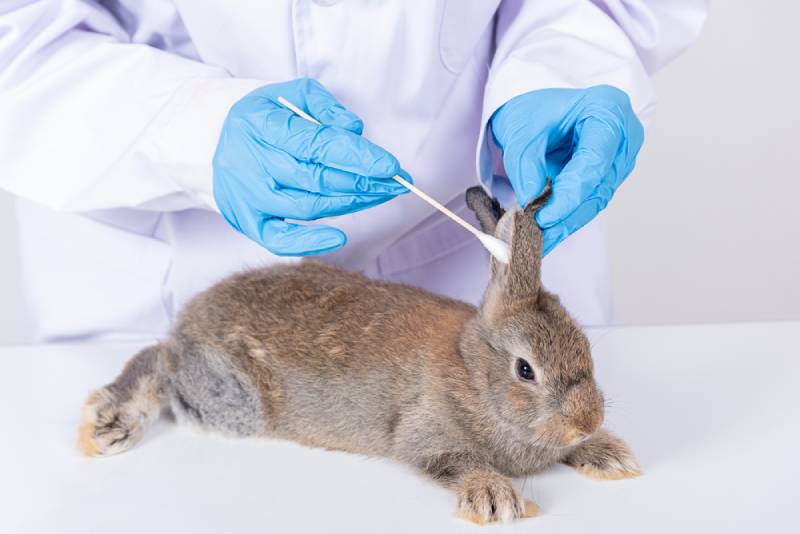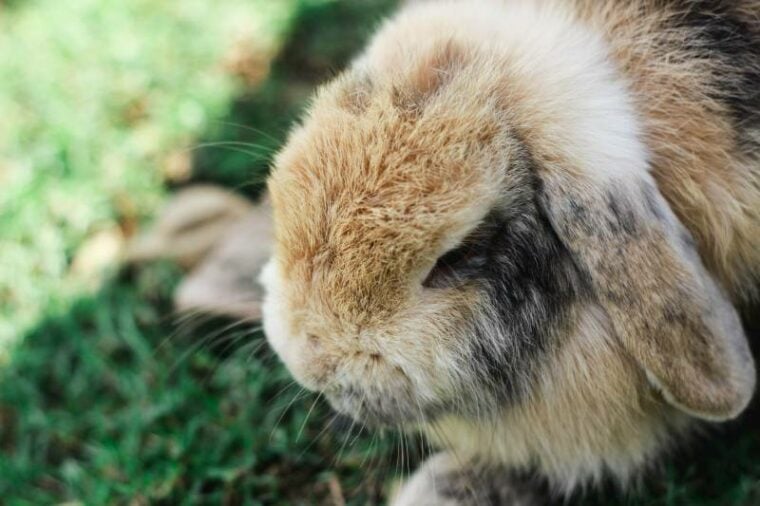
If a rabbit shakes, it can either be normal behavior or a sign of something wrong. It’s essential to observe your pet to discern how they’re moving and what other behaviors you are seeing. It can also provide vital clues to identifying a potential problem. Remember that rabbits are an easily stressed prey species that sometimes may be shaking, twitching, or rippling their coats, particularly if they are scared.
A stressed or sick bunny may be anxious, lethargic, painful, not move much, and often defecate less or none at all. They may be aggressive or avoid contact with you or not be eating well and sleeping more than usual. If you think your rabbit isn’t well, get them checked by the vet on the same day, as their health may decline rapidly and irreversibly. Let’s review some reasons your pet may be shaking, covering benign and serious causes.
The 12 Possible Reasons Rabbits Shake
1. Happy and at Ease
Sometimes, a bunny will shake because they’re so happy and content or excited. All’s right with the world. They’re well-fed and taken care of properly. Perhaps you get this feeling of euphoria, too, at times. Your rabbit may act silly and run around the room, jumping into the air. Enjoy these moments and pat yourself on the back for being a good and responsible pet owner.
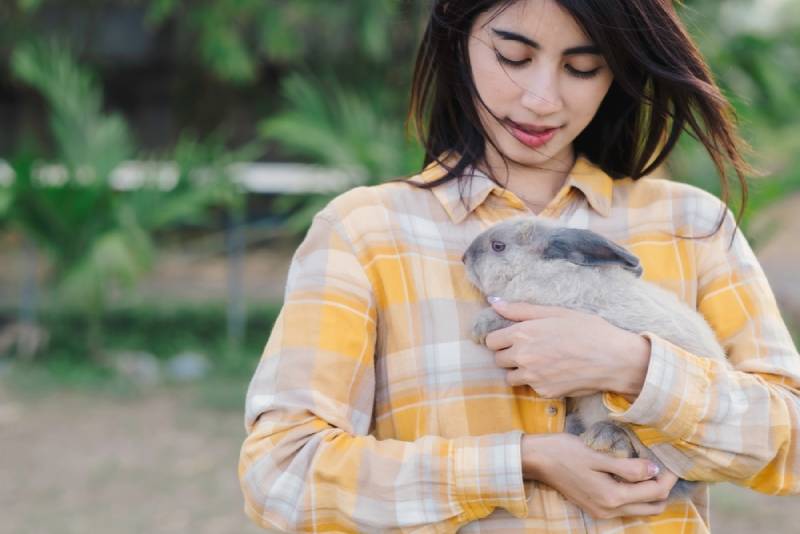
2. Angry
On the other end of the spectrum, anger can cause a rabbit to shake. You probably can surmise that your bunny isn’t happy by their body language. They may look tense and uncomfortable or even try to bite. Lagomorphs are usually quiet animals. When one starts thumping their feet, growling, or grunting, you have one unhappy camper on your hands.
3. Hiccups
Sometimes, a rabbit shakes simply because they’re hiccuping. This action is an involuntary contraction of the animal’s respiratory muscles of the diaphragm. This may exhibit as your rabbit’s head bobbing up and down slowly, rather than actual hiccuping sound. An occasional occurrence is no cause for concern, and it remains a bit of a mystery still. If it persists, it’s time to visit the vet.
4. Dreaming
Rabbits, like people, also seem to dream when they sleep. And just as they can startle you, they can have a similar effect on your pet. Most of the time, bunnies are light sleepers. About 10% of their sleep is in the REM phase. That’s when they may start dreaming. Of course, we don’t know what their brains conjure during these times. However, you may see your pet shaking and quaking as they sleep.
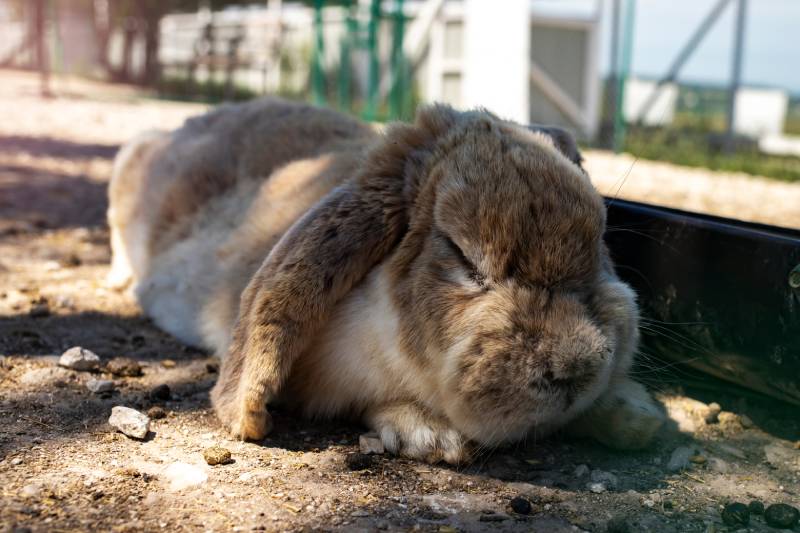
5. Fear
Even domesticated rabbits have many of the same instincts as their wild counterparts. That comes from being a prey species. Fear is a potent emotion in bunnies. It can cause an animal to shake. Again, body language is a vital clue. If you notice your pet flattening their ears or their nose twitching, they may be scared of something.
6. Stress
Stress is an uncomfortable feeling that may cause your rabbit to shake. A new pet will likely experience it. However, changes to the routine or another animal in the house can also increase stress. It can even happen if your bunny doesn’t want to be handled. The best thing to do is let your rabbit be. Make sure they have everything they need, including a place to hide where they feel comfortable and won’t be disturbed by other pets or unfamiliar people.
7. Ear Mites or Infections
Ear mites, external parasites like fleas, and skin or ear infections can make your bunny miserable and itchy. A telltale sign that something is up is your pet shaking their head or other parts of their body often, or scratching. Never use cat or dog products on your rabbit, as some of the ingredients may be harmful or even toxic. Speak to your vet about adequate mite and flea protection for your bunny.

8. Too Cold
Your bunny may shake if they feel cold, the same as you would. We shiver to try to raise our body temperature from the heat given off by that action. You should have a bed or hiding place in your pet’s hutch so they can snuggle up and get warm. Make sure the hutch isn’t near any drafts or registers. Average household temperatures are suitable for lagomorphs.
9. Disease
Illness and pain may also cause rabbits to shake, alongside changes in their demeanor, energy levels, appetite, and defecation and urination habits. These could be organ system disease, infections, or even parasitic infestations.
Clean housing is imperative for rabbits to prevent illnesses, such as internal parasites. Several health conditions can plague animals kept in less-than-sanitary living quarters. Of course, litter-box training makes your job easier. Nevertheless, parasites, such as Encephalitozoon cuniculi, can cause several other signs, such as neurological or ocular changes, head tilt, and seizures.
10. Poisoning
A sudden episode of shaking in an otherwise healthy rabbit can be a sign of poisoning. Bunnies are curious animals, making bunny-proofing your home essential. Unfortunately, some toxins may not trigger signs right away. We strongly urge you to contact your vet immediately if your pet has seizures or other telltale red flags of poisoning since rabbits can’t vomit.
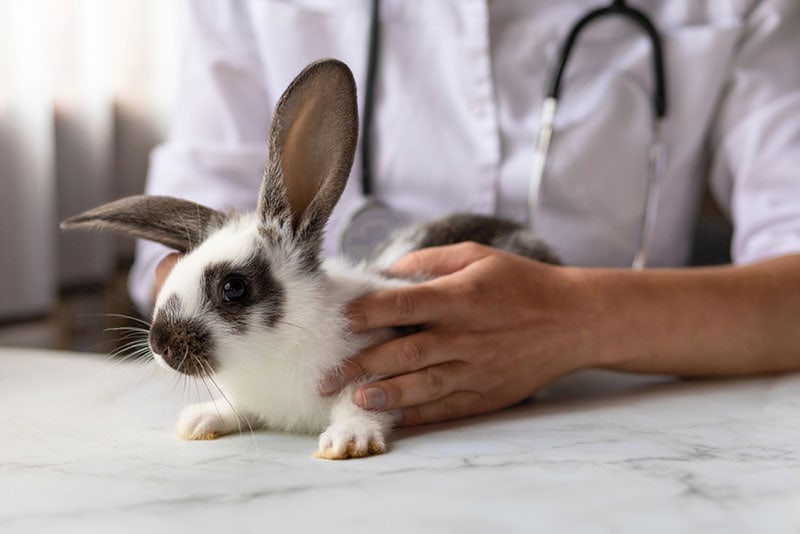
11. Heatstroke
Hot temperatures are equally harmful to rabbits, potentially causing heatstroke. Shaking is one sign. As important as it is to keep your rabbit out of the cold weather, it is equally important to ensure they are not too hot. Never leave them in a hot outside environment, particularly an enclosed one, especially without shade, fresh water, and supervision. Outdoor hutches need to be safe and secure to protect your rabbit from predators, and contact with wild rabbits that may carry certain diseases.
Lagomorphs manage their body temperature through the dilation of the blood vessels in their ears, alongside changes in their breathing and muscle movements leading to shaking. If you believe your rabbit is too cold due to exposure to bad weather, draft, rain, or illness or is too hot and exhibiting signs such as weakness, collapse, fast breathing, wobbliness, tremors, shaking, or anything else that is out of the norm, they need to be seen by your vet urgently.
12. GI Stasis
Like cats, rabbits spend a lot of time self-grooming, which can result in hairballs or even blockages. Same may occur if they ingest something inedible. However, more commonly, even slight changes in the diet may lead to dental issues and digestive upset. That’s particularly true if the animal isn’t eating enough hay. Signs of gastrointestinal stasis include loss of appetite, lethargy, painful or distended abdomen, reduced fecal production, or no feces at all. Early recognition and treatment is crucial since it’s usually advanced by the time you notice the signs, and a vet should be contacted immediately.
Conclusion
Rabbits are expressive animals; that is, if you know how to read their body language. Shaking is often harmless. However, that’s where getting to know your pet makes a big difference. It could mean a happy bunny, or it can be other negative emotions or a sign of disease. The essential thing is to monitor your rabbit’s habits so that you know what’s normal and what’s not.
See also:
Featured Image Credit: tannz, Shutterstock






